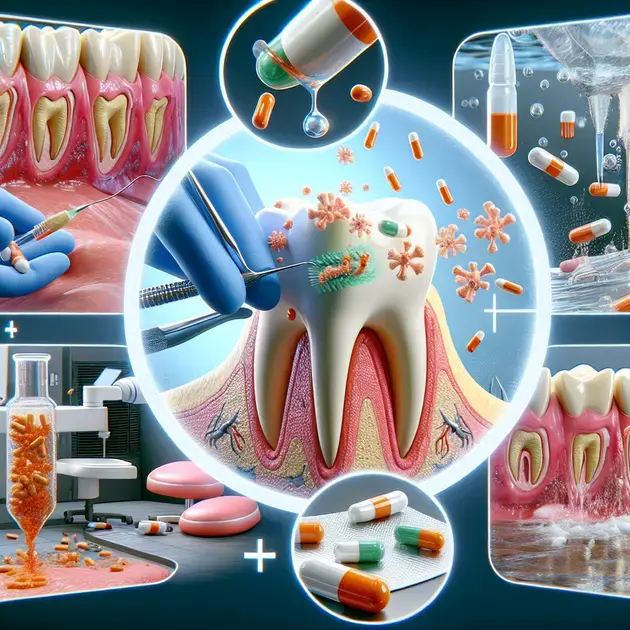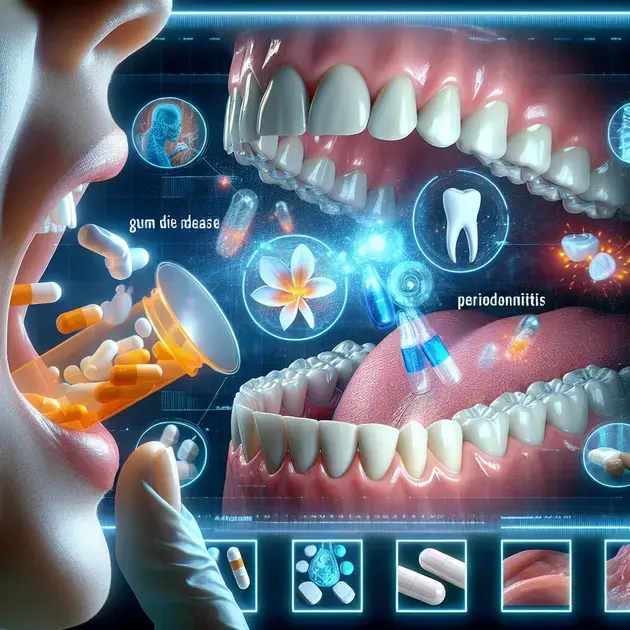Are you looking for a comprehensive guide on effective medication for periodontitis? Look no further, as we have gathered the most up-to-date information and treatment options to help you combat this common oral health issue.
Periodontitis, also known as gum disease, is a serious condition that affects the gums and can lead to tooth loss if left untreated. In this guide, we will explore the various medications available to effectively manage and treat periodontitis, providing you with the knowledge you need to make informed decisions about your oral health.

Understanding Periodontitis Treatment Options
Understanding Periodontitis Treatment Options
Periodontitis is a serious gum infection that requires prompt and appropriate treatment to prevent further complications. There are several treatment options available, depending on the severity of the condition. It is essential to consult with a dentist or periodontist to determine the best treatment plan for your specific case.
1. Professional Dental Cleaning
Professional dental cleaning is a crucial part of treating periodontitis. This procedure involves removing plaque and tartar build-up from the teeth and gums, helping to reduce inflammation and prevent further infection. It is recommended to have regular professional cleanings to maintain good oral health and prevent periodontal disease progression.
2. Scaling and Root Planing
Scaling and root planing are non-surgical procedures that involve deep cleaning of the teeth and roots to remove plaque and tartar. This treatment helps to smooth the tooth roots, making it more difficult for bacteria to adhere and causing further infection. Your dentist or periodontist may recommend multiple sessions of scaling and root planing to effectively treat periodontitis.
3. Antibiotics
In some cases, antibiotics may be prescribed to help control bacterial infection in the gums. This can be in the form of oral antibiotics or antibiotic mouthwash. It is essential to follow your dentist’s instructions carefully when taking antibiotics and complete the full course of treatment to ensure effectiveness.
4. Surgery
For severe cases of periodontitis, surgical intervention may be necessary. Surgery can involve procedures such as flap surgery to reduce the pocket depth between the teeth and gums, bone or tissue grafts to regenerate lost bone or gum tissue, and guided tissue regeneration to encourage new tissue growth. Your periodontist will discuss the surgical options available and recommend the most appropriate treatment for your condition.
5. Ongoing Maintenance
Once you have undergone treatment for periodontitis, it is crucial to maintain good oral hygiene practices to prevent recurrence. This includes daily brushing and flossing, regular professional cleanings, and monitoring your oral health with your dentist or periodontist. By following a comprehensive maintenance plan, you can effectively manage periodontitis and preserve your oral health.
Exploring Medication for Gum Disease
Exploring Medication for Gum Disease
In addition to professional dental treatments, medication can also play a role in managing gum disease. There are various types of medications available to help control the infection and inflammation associated with gum disease. It is essential to consult with your dentist or periodontist to determine the most suitable medication for your specific condition.
1. Antibacterial Mouthwash
Antibacterial mouthwash can help to reduce the bacterial load in the mouth and prevent further infection. It is often prescribed in conjunction with other treatments, such as scaling and root planing, to enhance the overall effectiveness of the treatment plan. Using antibacterial mouthwash as directed by your dentist can help promote healing and reduce inflammation in the gums.
2. Antiseptic Gels
Antiseptic gels are another form of medication that can be applied directly to the gums to help combat infection and reduce inflammation. These gels are typically used in targeted areas where deeper cleaning may be required. Your dentist may recommend the use of antiseptic gels as part of your overall treatment plan for gum disease.
3. Antibiotics
In cases of severe gum disease, oral antibiotics may be prescribed to help control the bacterial infection. It is essential to take antibiotics exactly as prescribed by your dentist and complete the full course of treatment to ensure effectiveness. Antibiotics can play a crucial role in reducing inflammation and promoting healing in the gums.
4. Pain Medication
For individuals experiencing pain or discomfort due to gum disease, pain medication may be recommended to provide relief. Over-the-counter pain relievers or prescribed medications can help manage pain and improve your overall comfort during the treatment process. It is important to follow your dentist’s instructions when taking pain medication.
5. Anti-Inflammatory Drugs
Anti-inflammatory drugs can help reduce inflammation in the gums and alleviate discomfort associated with gum disease. These medications work to suppress the body’s inflammatory response, helping to promote healing and reduce swelling. Your dentist may recommend the use of anti-inflammatory drugs as part of a comprehensive treatment plan for gum disease.

Understanding Periodontitis Treatment Options
Periodontitis is a serious gum infection that damages the soft tissue and destroys the bone that supports your teeth. It can lead to tooth loss if left untreated. Understanding periodontitis treatment options is crucial for managing this condition effectively. Treatment options for periodontitis vary depending on the severity of the infection and may include non-surgical or surgical interventions.
Non-surgical treatments for periodontitis typically involve scaling and root planing, where the dentist removes plaque and tartar from the teeth and smooths the root surfaces to prevent bacteria from accumulating. This procedure can help reduce gum inflammation and promote healing. In some cases, antibiotics may be prescribed to control the infection and promote healing.
If non-surgical treatments are not effective or if the periodontitis is severe, surgical interventions may be necessary. These can include flap surgery, where the gums are lifted back to remove tartar and smooth the root surfaces, or bone grafts to replace lost bone tissue. Understanding the pros and cons of each treatment option is essential for making an informed decision about your oral health.
It is also important to maintain good oral hygiene practices at home to prevent periodontitis from recurring. Regular brushing, flossing, and dental check-ups can help keep your gums healthy and prevent the progression of gum disease. Working closely with your dentist to create a personalized treatment plan is key to managing periodontitis effectively and preserving your oral health.
Overall, understanding periodontitis treatment options is vital for addressing this common oral health issue. By exploring both non-surgical and surgical interventions, patients can work with their dental care team to create a comprehensive treatment plan that meets their individual needs and promotes long-term oral health.
Exploring Medication for Gum Disease
Gum disease, also known as periodontal disease, is a common condition that can cause inflammation, infection, and even tooth loss if left untreated. Exploring medication for gum disease is one option for managing the symptoms and preventing the progression of the disease. There are several types of medications that may be prescribed for gum disease, including antibiotics, antimicrobial mouth rinses, and prescription-strength toothpaste.
Antibiotics are often used to treat gum disease by targeting the bacteria that cause infection and inflammation. They can be prescribed in pill form or as a gel that is applied directly to the affected area. Antimicrobial mouth rinses can also help reduce plaque and bacteria in the mouth, promoting gum health and preventing further damage.
Prescription-strength toothpaste may contain special ingredients that help control plaque and prevent gum disease. These toothpastes are designed to be more effective than over-the-counter options and can be a valuable addition to your oral health routine. It’s important to follow your dentist’s recommendations for medication use and maintain good oral hygiene practices for optimal results.
Exploring medication for gum disease is just one aspect of managing this common oral health issue. In addition to medication, maintaining a healthy diet, quitting smoking, and scheduling regular dental check-ups are important steps in preventing and treating gum disease. By working with your dental care team and following their recommendations, you can effectively manage gum disease and protect your oral health.
Effective Strategies for Managing Periodontitis
Managing periodontitis, a severe form of gum disease, requires a proactive approach to oral health. Effective strategies for managing periodontitis focus on reducing inflammation, controlling infection, and preventing further damage to the gums and bones that support the teeth. These strategies may include both professional treatments and at-home care practices to promote long-term oral health.
Professional treatments for managing periodontitis can include scaling and root planing, gum grafts, and laser therapy to remove bacteria and promote healing. These procedures are typically done in a dental office under local anesthesia to ensure patient comfort. Your dentist may also prescribe antibiotics or antimicrobial mouth rinses to control infection and prevent the spread of bacteria.
At-home care practices play a crucial role in managing periodontitis and preventing its recurrence. Regular brushing and flossing, using an antimicrobial mouth rinse, and eating a balanced diet can help keep your gums healthy and reduce the risk of further inflammation. Avoiding tobacco products and maintaining regular dental check-ups are also important for managing periodontitis effectively.
By following effective strategies for managing periodontitis, patients can work towards improving their oral health and preventing the progression of gum disease. It is important to work closely with your dental care team to create a personalized treatment plan that addresses your specific needs and promotes long-term gum health. With the right approach and a commitment to good oral hygiene, you can effectively manage periodontitis and protect your smile for years to come.
Conclusion
In conclusion, understanding periodontitis treatment options is crucial for effectively managing this serious gum infection. Whether opting for non-surgical interventions like scaling and root planing or more invasive surgical procedures such as flap surgery or bone grafts, knowing the pros and cons of each approach is essential for informed decision-making regarding oral health.
Exploring medication for gum disease, including antibiotics, antimicrobial mouth rinses, and prescription-strength toothpaste, offers additional avenues for symptom management and disease progression prevention. Combining medication with a healthy diet, cessation of smoking, and regular dental visits forms a comprehensive strategy for combating gum disease and safeguarding oral health in the long term.
Effective strategies for managing periodontitis encompass professional treatments like scaling and root planing, gum grafts, and laser therapy, alongside diligent at-home care practices such as regular brushing, flossing, and antimicrobial mouth rinse use. By collaborating closely with dental professionals to create personalized treatment plans tailored to individual needs, patients can proactively improve oral health and curb the advancement of gum disease for years to come.



